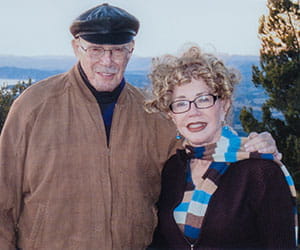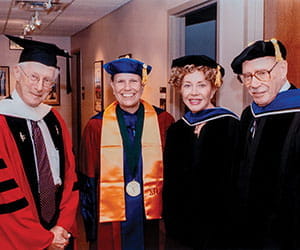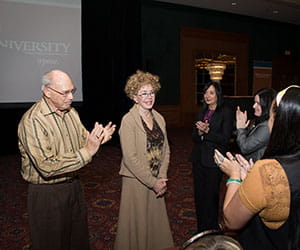It all started in a living room with $15,000, a guerilla marketing campaign, and—most importantly—a dream to create better access to doctoral education for mid-career professionals. Forty-eight years later, thousands of lives have been changed and the paradigm of higher education has shifted.
But well before the founding of Walden University in 1970, Bernie and Rita Turner were making a difference in the lives of the unprotected and the underserved. Both were born to immigrant parents from Poland and Russia, and seeing how hard their parents had worked to create a new life for their families in New York, they each knew they had a legacy to uphold. Today, that legacy lives on as we return to the academic headquarters in Minnesota to celebrate Walden University’s 60th Commencement Ceremony.

Meet the Turners: The Founders of Walden University
Driven by Ideas
Bernie Turner had a profound love of ideas, which he credits to his elementary school teacher. But without proper intellectual stimulation in high school, Bernie simply didn’t excel academically. Regardless, he graduated at 16 and soon enlisted in the Organized Reserve Corps (now known as the Army Reserve), knowing he would then be able to get a university education through the military. During that time, he worked with the Department of Veterans Affairs’ (VA) insurance division and enrolled in an engineering program at Cornell University. Six months later, he was activated in the infantry and then was deployed to Europe in January 1945 to fight in World War II.
What he saw during the war—exploitation of the defenseless—stuck with him. Upon his homecoming, Bernie returned to work at the VA and applied to Columbia University. “Going back to school was not so much an attempt to become a scholar as it was to get clues as to how this screwed-up society worked,” he says.
Bernie majored in economics, and after taking summer classes, he graduated with his degree in 3.5 years. After graduation, he worked as an economist with the National Industrial Conference Board, where he traveled the country to get information about the cost of living index. He didn’t know it at the time, but this would inspire his next great passion.
Acting on Her Dreams
Rita (Morrison) Turner comes by her passion for activism naturally. During World War II, her whole family pitched in from home to help with the war efforts. “My parents had a keen interest in not only what they believed was right for the United States but for the world as well,” she recalls.
Even still, Rita’s parents were confused by her desire to pursue a college education and a career. When she was 18, she got a job at Woolworth to contribute to the household expenses. One day, she told her boss that she was leaving to enroll in college. “Good for you,” he told her. “The money you make here will disappear, but your education will always stay with you.”
That may have been all the encouragement she needed. Rita found a way to make her dream of a higher education possible, enrolling at Brooklyn College. But she still had to contribute to the family, so she worked throughout her schooling, sometimes having to attend school part time so she could pull in a full-time income.
That determination and insatiable passion for education would serve Rita well—and continues to do so to this day. Her major? Not surprisingly, education.
Finding Their Passions—and Each Other
While working for the Conference Board, Bernie learned a lot: “What I came away with was the feeling that the workers were simply treated as assets of the corporation and could be discarded, ignored, or what have you at the pleasure of the corporation.” Soon, he enrolled in graduate school to study labor-management relations and sociology and began working as a business agent and labor organizer for the Amalgamated Clothing Workers of America.
Bernie simply believed every person deserved a fair shake at whatever they were trying to accomplish. Rita felt the same way about her students. She focused on special education in college and taught third grade and served as a reading specialist on Long Island, New York, where she focused on teaching her students in the ways they needed to learn individually. By the end of the year, many of her third-graders were reading on a fifth-grade level. This inclination to meet people where they are to help them succeed would be the foundation for Bernie and Rita’s greatest dream.
After meeting at a neighborhood pub in the spring of 1954, Bernie and Rita’s courtship was quick. Just 8 months later, they were married. As they built their life together, the Turners continued to follow their passions.
Rita enrolled at City College of New York for a master’s degree to work toward her goal of helping learning-disabled children. Her school system conducted standardized testing at the end of first grade, which could have been incredibly beneficial as a diagnostic tool. Unfortunately, nothing was done to find solutions for the children who were identified by this test as having learning disabilities. Wanting to help however she could, Rita did a lot of outside research to help her students succeed, and she became more involved in helping other interested teachers focus on these underserved children.
At the age of 30, Bernie left the labor movement, which was becoming violent, to become a teacher. He pursued his master’s degree at Hofstra University part time while also teaching at the university. Bernie was told that getting his PhD would greatly benefit his career, but the required yearlong residency would mean putting his career and family time on the backburner. He just couldn’t see doing that.

The Spark for a New Kind of University
As Rita and Bernie each navigated the complicated realm of education in America, they continued to realize that education could be used as an impetus for social change. In Aspire Toward the Highest: Bernie and Rita Turner and the Founding of Walden University, author Wade Keller writes, “One could impact teachers and administrators, who in turn could impact the student body, who in turn could impact the family, who in turn could impact general society.”
But how could they make it more effective?
As Rita and Bernie talked about what they were seeing in their careers, they kept coming back to one thing. In Rita’s own words: “… if we put our heads together and concentrated on the development of an educational institution that devoted itself to positive social change, we would not only make a very good team, we would also accomplish the larger mission.”
And thus the seeds of Walden University were sown.
Fulfilling a Need: Vision Meets Execution
From his own experience, Bernie realized that there must be many others who had gone as far as they could without a doctorate but were either too old to be considered for admission or had family and financial obligations that would keep them from fulfilling the residency requirement. There had to be another way.
Keller writes: “Perhaps a nontraditional … intensive summer program with top-rate faculty from existing universities might just work. After the intensive summer session, the students would maintain contact with their faculty members by personal visits, phone, and mail. That was the vision.” But Bernie knew he needed a partner who could help him get it done.
Fortunately, he didn’t have to look beyond his own living room. Bernie told Rita about his dream and asked her to help him make it happen. With $15,000 saved up, they wrote a two-page description of their vision, ran copies, addressed envelopes, and mailed them to several thousand school administrators across the country.
They received hundreds of responses, including one from Harold L. “Bud” Hodgkinson, who had the year prior written a white paper, called “Walden U: A Working Paper,” that articulated his ideal university with the student at the center of it.
Walden CEO Paula Singer thinks that was just the validation the Turners needed to take the leap. “What seems like a creative or crazy idea sometimes needs a validator,” Singer says. “Good ideas need early supporters who have the experience and the credentials of the traditional while supporting the new.”
After talking with the Turners, Hodgkinson was on board to be a faculty member for the first summer session. Now Bernie and Rita just had to find a home for it. They traveled the Tamiami Trail in Florida in the summer of 1970 in search of an area that was both kid-friendly to accommodate the students’ families but remote enough to ensure focus on studies. They found exactly that at The Cove Inn on Naples Bay, the site of the first four summer sessions from 1971 to 1974.
Walden University began preparations for the first class in December 1970. The admissions requirements were relatively simple: Applicants had to have a master’s degree plus 9 credits and 3 years’ experience in education or an allied professional field.
In July 1971, 141 doctoral students traveled to The Cove Inn to begin their studies with Walden. Many came to Walden having already begun their research projects at other institutions. Because of that, the first Walden University commencement ceremony was held July 1, 1972, conferring 46 PhDs in Education and 24 Doctors of Education (EdDs). The second summer session began July 5.
An Evolving University

A Better Option
“Our students get sandwiched. They have children, they have aging parents, and they have work responsibilities,” Singer says. “They’re looking for their education to be convenient, flexible, affordable, and relevant. That’s what the Turners saw in 1970, and that’s what still makes Walden so appealing to working professionals today.”
You have to look no further than interim president Dr. L. Ward Ulmer ’04, who earned his PhD in Applied Management and Decision Sciences (now PhD in Management) from Walden, to see just how much opportunity this university presents. In 2001, Ulmer was in a doctoral program at Clemson University, but he worked full time, had three kids, and traveled a lot for business. The next class he needed in his program was only offered on Tuesdays and Thursdays at 8 a.m.—and he lived 3-4 hours from campus. When Clemson couldn’t offer him any alternatives, he needed to look elsewhere.
“No one was working with adult students like Walden was at the time,” Ulmer says. “Walden was clearly the most reputable of the institutions. It was just a great fit for me. That’s the first thing I told Bernie and Rita when I met them at a commencement weekend several years ago. I thanked them. If it weren’t for Walden, I probably never would have finished my doctorate, much less gotten two.”
He eventually returned to Clemson to complete his PhD in Higher Education Leadership. But Ulmer’s story is like that of many of Walden’s earliest students.
Growing Pains
By the third academic year, the Turners had to turn several qualified applicants away due to a full class. Having outgrown The Cove Inn, they looked for alternative locations. Over the next several years, Walden University’s summer sessions moved from Florida to Rhode Island, Delaware, Indiana, and Minnesota.
The popularity of the university aside, the road to accreditation and licensure proved to be a challenge for the nontraditional university. Walden was first granted licensure in Florida, but it would first be accredited by California, allowing it to be listed in the federal registry of degree-granting universities.
A series of curriculum and leadership changes ultimately led to the 1979 licensure in Minnesota (where the new academic and administrative headquarters would be) and the 1990 regional accreditation by the North Central Association Commission on Accreditation and School Improvement. “Minnesota really became home base for us,” says Dr. Eric Riedel, Walden’s provost and chief academic officer.
Dreaming Bigger

And continue it has. Although Walden’s leadership is vastly different than it was in the 1970s, there is no fear of “out of sight, out of mind” here. The university is still on the Turners’ minds, just as the Turners are still on ours.
Dr. Iris M. Yob, faculty emerita who has been with Walden since 2002, recently interviewed the Turners and found that they still have creative ideas about what Walden could be doing. “They can’t help themselves when it comes to pushing the envelope for Walden to do better,” she says.
The faculty and staff continue to admire the Turners’ commitment to quality education and thank them for the vision that’s led the university to where it is today. “Their willingness to take a gamble on making their dream a reality is inspiring. That mission is what still draws students, faculty, and staff here today,” says Dr. Denise DeZolt, senior vice president of academic accreditation and compliance, who first joined Walden as a faculty member in 1995 and went on to serve as chief academic officer.
“Bernie and Rita’s foresight is still so relevant today,” Ulmer says. “They created an environment that is so conducive to collegiality—to us all being in this together—that they really put us in a place to be comfortable around each other. I think the fact that they want to be called Bernie and Rita instead of Mr. and Mrs. Turner speaks volumes about their leadership and how they are the very epitome of all Walden represents.”
Since that first graduating class in the summer of 1972, Walden has awarded degrees to more than 126,000 people at the undergraduate, graduate, and doctoral levels of education. And those alumni have gone on to found nonprofits, start or transform companies, teach others, and work in their communities with the same fervor that the Turners have always had.
“We have a community of diverse scholar-practitioners in 2018,” Riedel says. “Bernie and Rita’s mission is still alive and relevant every day. We have long roots here in Minnesota, so it’s great to come back here for this milestone commencement to honor them and their work.”
— Lindsay Sherman
 LEAVING A LASTING IMPRESSION
LEAVING A LASTING IMPRESSION
Since leaving Walden in 1992, the Turners have returned to events held by the university from time to time, whether residencies or commencement weekends. Their presence leaves a lasting impression on those in the Walden community.
A Living Legacy
To this day, Walden presents awards in honor of its founders and early leaders. This connection to the past keeps the mission of the university at the forefront of our thinking as students and faculty.
Harold L. Hodgkinson Award: Presented to a graduating student whose dissertation is judged as meeting the highest university standards of academic excellence
Bernard L. Turner Award: Presented to the Hodgkinson award winner’s dissertation committee
Frank Dilley Award: Presented to a graduating student whose doctoral study is judged as meeting the highest university standards of academic excellence
Rita Turner Award: Presented to the Dilley award winner’s doctoral study committee

WALDEN UNIVERSITY TIMELINE
- 1969 Harold “Bud” Hodgkinson publishes “Walden U: A Working Paper,” an article that initiated the concept of a student-centered university.
- 1970 Bernie and Rita Turner send out information about their idea for a new university to gauge interest and are overwhelmed with the response they get.
The Turners travel the Tamiami Trail to find a home for Walden.
Walden University chooses Florida to offer its first in-person sessions. - 1971 First summer session is 4 intensive weeks at The Cove Inn on Naples Bay in Florida.
- 1972 Walden is granted licensure by the Florida state board of Independent Colleges and Universities after a lengthy process.
Walden University confers 46 PhDs and 24 EdDs at its first commencement ceremony.
Second summer session begins with Bud Hodgkinson as the first dean of the university. - 1979 The Minnesota Higher Education Coordinating Board approves Walden’s request for licensure, permitting the university to grant PhDs and EdDs in Minnesota.
- 1982 Walden’s academic and administrative offices move to Minneapolis, while the finance office remains in Naples.
- 1984 The Walden curriculum is restructured to emphasize how professions are affected by social change.
- 1987 The academic catalog outlines the new format of the individualized doctoral program, which is structured into a professional development plan (PDP), knowledge area modules (KAMs), and then the dissertation.
- 1988 The North Central Association Commission on Accreditation and School Improvement (NCA) grants Walden candidacy status.
- 1990 Walden is granted regional accreditation by NCA.
- 1995 Bernie and Rita Turner are awarded honorary doctorates at the 25th Commencement Ceremony.
- 2001 Walden introduces the MBA, MPA, and PhD in Public Policy and Administration.
- 2004 Walden University becomes part of the Laureate Education, Inc. network of universities.
- 2005 To celebrate Walden’s 35th anniversary, Bernie and Rita Turner deliver the commencement address.
- 2010 Walden celebrates its 40th anniversary.
The Walden University Alumni Association is founded. - 2012 The Richard W. Riley College of Education and Leadership and its educator preparation programs are accredited by the National Council for Accreditation of Teacher Education (NCATE).
- 2013 Walden celebrates its 50th Commencement Ceremony in Minnesota.
Walden receives reaffirmation of regional accreditation from the Higher Learning Commission, which grants accreditation to Walden for 10 more years. - 2015 Walden University introduces Tempo Learning™ for competency-based education, becoming only the sixth institution with direct assessment approval by the U.S. Department of Education.
- 2018 Walden celebrates its 60th Commencement Ceremony in Minnesota.
Walden magazine publishes its 25th issue.



